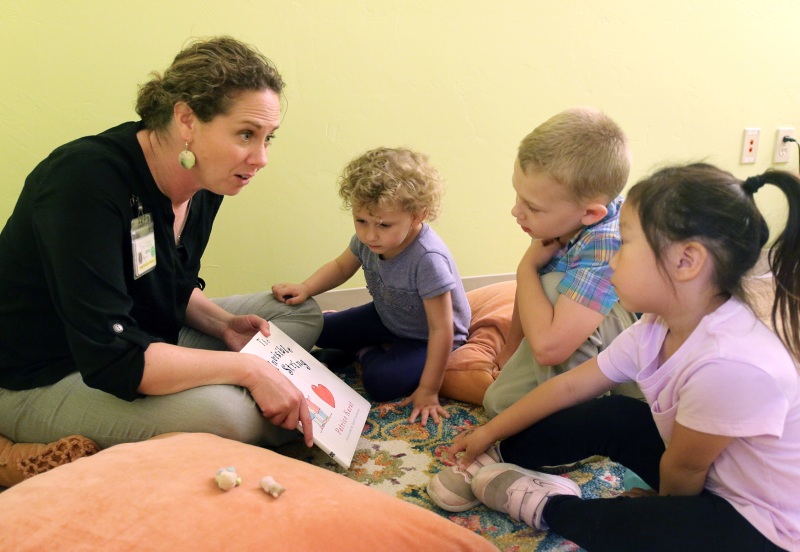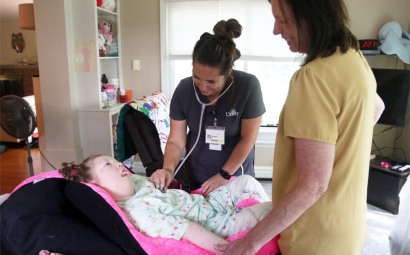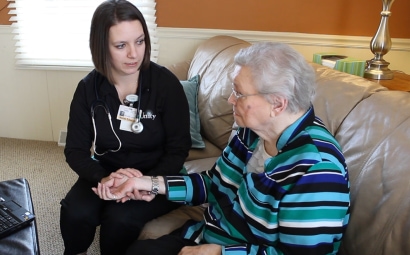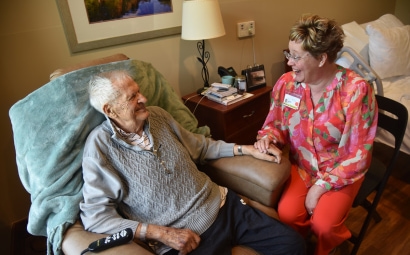How To Talk To a Loved One About Hospice Care
Discussing hospice care with a loved one can feel overwhelming, but it is one of the most meaningful ways to support their comfort, dignity, and peace of mind throughout the end-of-life journey. Beginning the conversation early can also help prevent unwanted treatments and hospitalizations, ensuring care aligns with their wishes.
Tips for a Compassionate Conversation About Hospice Care
- Choose the Right Moment – Select a calm, private time when you can talk without interruptions. A peaceful setting helps everyone feel comfortable, supported, and heard.
- Be Gentle and Patient – This may be your loved one’s first-time considering hospice care. Allow them time to reflect, ask questions, and process their feelings without pressure for immediate decisions.
- Use Clear, Simple Language – Avoid medical jargon or unclear terms. Phrases such as “hospice care focuses on managing symptoms and ensuring comfort” help make the conversation easier to understand and less overwhelming.
- Actively Listen – Encourage conversation by asking open-ended questions and genuinely listening to your loved one’s thoughts, fears, and hopes. Embrace moments of silence as they provide space for reflection and allow your loved one to process and express their feelings at their own pace.
- Reassure Them - Emphasize that hospice care is about receiving specialized care and support, not giving up. Its focus is on improving quality of life so they can live as fully and comfortably as possible.
- Summarize Your Conversation - At the close of your conversation, gently recap the key points discussed. This helps ensure clarity, confirms your loved one’s preferences and decisions, and fosters a shared understanding before ending the discussion. For instance, you might say, “I want to make sure I understood correctly. You would like to focus on staying comfortable at home, receive support from family and friends as needed, and review your advanced directives soon. This is all support provided by hospice care. Does that sound right?”
Conversation Prompts to Get Started
Initiating a conversation about hospice care can be sensitive. Preparing a few thoughtful, compassionate questions in advance can help guide the discussion with care and understanding.
- Do you know what hospice care is? Would you like me to share some information about the benefits it provides for you as well as support for the entire family?
- Share a story about someone you know who received hospice care. Highlight during your story that hospice supports the entire family, not just the patient, with holistic services including pain and symptom management, emotional support, spiritual guidance, and grief counseling.
- What’s most important to you when it comes to your care and comfort?
- Have you thought about what kind of care you’d want if your illness gets harder to manage?
- Is there anything you’re worried about or want to make sure is taken care of?
- How can I best support you through this time?
Hospice Myths vs Facts
Understanding hospice myths and facts before your conversation is crucial because misconceptions can cause unnecessary fear, anxiety, and delays in care, ultimately preventing a loved one from receiving valuable support and comfort during their final months. Educating yourself enables you to approach the conversation with confidence and compassion, using clear and simple language. Accurate information also helps reassure your loved one that they remain in control of their care.
Myth: Hospice is a Place
Hospice is compassionate, holistic care that prioritizes comfort, dignity, and peace of mind for patients and families facing terminal illness. Expert teams provide pain and symptom management, along with emotional, spiritual and grief support.
Myth: Hospice Care is Only for the Last Days of Life
Hospice care can last six months or longer, depending on the course of illness. Experts recommend at least three months of care for the greatest benefit.
Myth: Hospice Programs are the Same
While all hospice providers offer core services, nonprofit organizations deliver the highest quality care through more patient visits, deeper community connections, experienced staff, and expanded support like unique programs, inpatient hospice facilities, and grief centers. They put people over profits.
Myth: Hospice Care Only Supports the Patient
Hospice care supports both patients and their families, providing comfort and peace of mind. It focuses on the needs of the grieving family as much as on the dying patient.
Myth: Hospice is Giving Up Hope
Hospice care doesn’t mean giving up hope, but shifts it toward living fully and creating meaningful moments. Hospice helps families cherish personal and spiritual connections during the end of life.
Myth: Hospice Care is Expensive
Hospice care actually helps lower healthcare costs by preventing unnecessary hospital visits. Hospice is fully covered by Medicare, Medicaid, most private insurance plans, and the U.S. Department of Veterans Affairs. Unlike other healthcare, hospice treats the patient and family together as one unit of care. Rest assured you can access the end-of-life care you need without financial worry.
Myth: Once I Choose Hospice Care, I Can’t Change My Mind and Discontinue Services
Hospice care can be stopped or resumed at any time based on the patient’s choice.
Myth: Hospice Care Requires Stopping All Medications
Hospice does not require stopping medications that support the patient’s well-being. Treatments that no longer help, cause side effects, or aim to cure the illness may be adjusted to prioritize comfort and quality of life.
Myth: Hospice Care Means I Have to Give Up My Doctor and Routine Care
Your doctor collaborates closely with the hospice team to manage your pain and symptoms.
Myth: Hospice Care is Limited to Six Months
Hospice care typically begins when a physician certifies a life expectancy of six months or less, but care can continue as long as the patient remains eligible. Care duration is based on the patient’s condition, needs, and choice of comfort-focused care, with re-certification possible if they outlive the initial prognosis.
Myth: Hospice Hastens Death
Research shows hospice patients often live longer than those without hospice, while enjoying comfort and quality time with loved ones.
Myth: I Need to Wait for My Doctor to Recommend Hospice Care
Doctors often delay recommending hospice due to discomfort discussing end-of-life care, causing patients to miss months of supportive care. Families can consult their doctor or contact a hospice program directly to explore services like symptom management, personal care, and emotional support.
Myth: Hospice is Only for People Who Can Accept Their Terminal Diagnosis
Hospice helps patients and families come to terms with terminal illness at their own pace. Chaplains and social workers are available to discuss options and guide families through decisions.
Myth: Hospice Care is Only for Seniors
Hospice care supports patients of all ages—from unborn infants to seniors. Families seeking pediatric hospice should choose a program with specially trained staff who tailor care to the child and family’s unique needs.
Myth: Hospice is Only for Cancer Patients
Hospice care supports not only cancer patients but also those with many life-limiting illnesses. Conditions such as advanced heart, lung, kidney, liver, and neurological diseases benefit greatly from holistic hospice care.
Myth: Hospce Patients Must Sign a DNR
A “Do Not Resuscitate” (DNR) order is never required in hospice care, and the decision to sign one is entirely up to the patient and family. Hospice honors each person’s individual wishes regarding resuscitation.
Myth: Hospice Care is the Same as Home Health Care
Hospice care differs from home health care, as hospice patients don’t need to be homebound.
Myth: Hospice Patients Cannot Travel
With careful planning, hospice patients can travel anywhere within the United States. Talk to your hospice nurse in advance to coordinate medical, logistical, and supply needs for a safe, meaningful trip.
Myth: Only a Doctor can Make a Referral to Hospice
Anyone can make a referral to hospice including a potential patient, family member, friend, spiritual leader, social worker, or doctor. The hospice team will then follow up with the patient’s doctor to determine eligibility. Early referrals ensure the patient and family can benefit from all that hospice care provides.
Access Our Toolkit of Resources
- How Hospice Helps
- Hospice Myth vs Fact
- Signs to Start Hospice Care
- Hospice Comparison Checklist
- Grief Support Comparison Checklist


Extensive Grief Support Services Matter
It is important to ask a hospice provider if they have a robust bereavement and grief support program.











